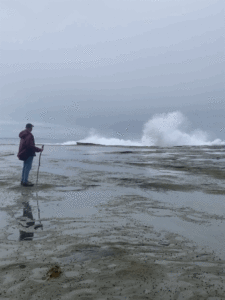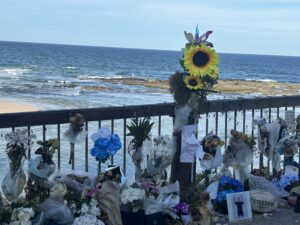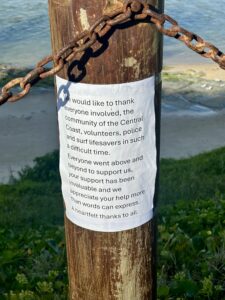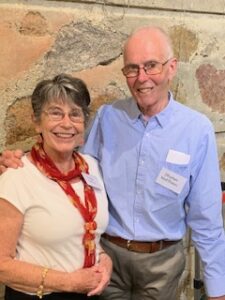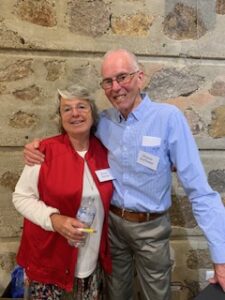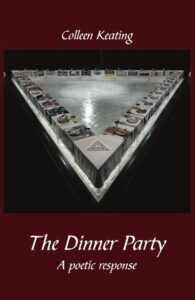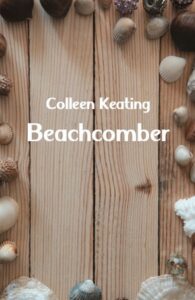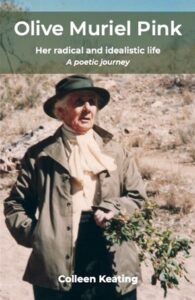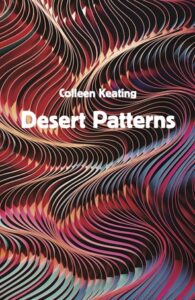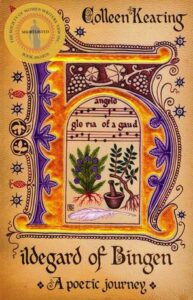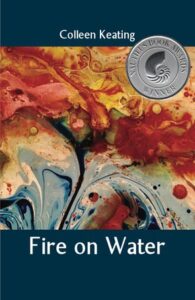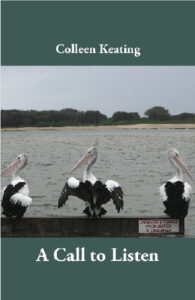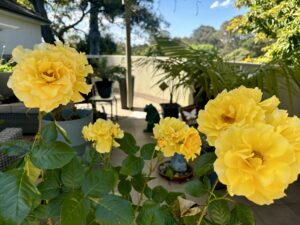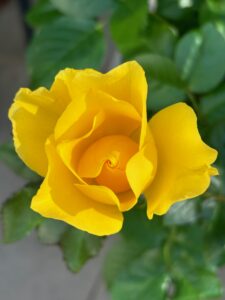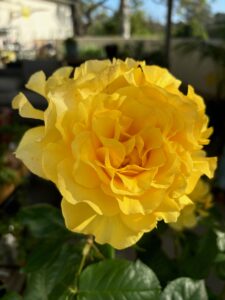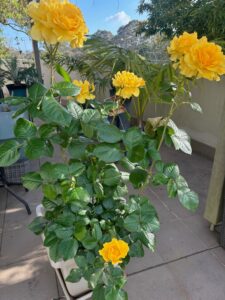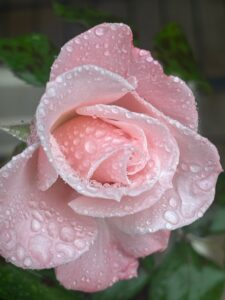
The magnet on the fridge door shines at me every-time
one step after another
and it has saved me through many times
where my steps have faltered
in the darkest nights where you fear the next step
in thick storms where the rain pelters piercing your very skin
in coldest times when your bones seem frozen
and now you see the words today
and only a mountain looms at you and it hurls rocks
on the way you try to obey and clamber and then you realise
you are not the only one attempting to go on.
Colleen
–––––––––––––––––––––––––––––––––––––––––––––––
********** A few strs shining brightly:***********
Lindsay McLaughlin from Friends of Silence
Ellen Bass poet
Christine Valters Paintner Abbess
Shakespeare
David Whyte
Waymakers

We must remind ourselves that millions of human beings throughout history have lived through worse political situations and still managed to make art, and find joy, and share meals and resist despair, We can do that . moving always towards wisdom.
In fact, cover us all in a wisdom that is not available in memes, hot takes, social media fake news and mis communications and the continuous news which sucks us down a rabbit hole. Some people thrive on chaos and can use chaos as smokes and mirrors .
Let us remember to breathe often, drink water and be always grateful for the nature and beauty around us every day.
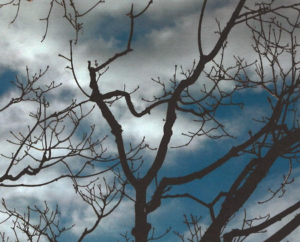
THE WAY IS AWKWARD

By the river it is cool and gray at last after a night of longed-for rain, however intermittent. Mist this morning clung to the trees, but it is gone now, leaving the caress of quiet moist air. The river is low, the banks brown, rock outcroppings breaking the water; but yet it flows, an ancient witness; as is the moss, growing up the north side of the oaks and box elders and sycamores, whose branches, sparse with brown and yellow leaves, form a wild weave against the pewter sky. A heron, guardian of edges, rises from the mud and glides in a wide arc to other shore.
I am here because the rocks and arrows hurled at all I have known, and all that I love, reached a new level of ferocity last week, and it seems that the speed and strength of the barrage will be relentless. Even after years of preparatory soul work, suddenly I can barely breathe. I thought the humbling might continue to creep toward us, with some mercy. Instead, the gods of mayhem spurred the horses.
In the wake of this, words have swirled: words to soothe, advise, comfort, inspire. I have passed them on, shared them; I am grateful for them all. But what I need may not be the call to march forward, to align with the highest benchmarks of humanity, to hold fast and to take skillful action, to neither wince nor flail. I need refugia and the wisdom of ancient beings like a river, trees, and moss.
Kathleen Dean Moore speaks of refugia in her book Great Tide Rising. Refugia are pockets of safety, tiny coverts where life hides from destruction, secret shelters out of which new life emerges. Refugia are why Mount Saint Helen’s mountainsides are lushly covered with grasses, prairie lupines, and alders, despite the eruption that erased 1,300 feet of the mountain and burned 230 square miles of forest.
Refugia are small and hidden and full of darkness, but they are potent. They may be characterized as sanctuaries, but they are cauldrons, wombs, incubators. They are everywhere: in a poem, the eyes of a friend, a preserved landscape, a permaculture garden, a prayer in the wild.
So I have come to the river, the stone cliffs, the moss growing on those old trees. Robin Wall Kimmerer writes, “Mosses, I think, are like time made visible…The mosses remember that this is not the first time the glaciers have melted…”, or a political system has failed. Kimmerer points out that mosses document a passage of time that is not linear. “…the knowledge we need,” she says, “is already within the circle; we just have to remember to find it again…”
There are beings on this planet older by far than elections and democracy, older than civilization, older even than the human imagination. They are here to turn to, to help us begin to breathe again. Four hundred fifty million years ago mosses traveled from the primordial waters and began a great experiment in evolution, as Kimmerer writes, “an experiment of which we are all a part, whose ending is unwritten.”
Unwritten, and unknown. Some would say that is the definition of hope, an invitation to act out of our places of refugia, out of the wisdom of mosses, rather than reaction to the certainty of the dystopia we think we know has arrived.
Bayo Akomolafe says, “the way is awkward, not forward”. Perhaps that is the challenge: To stumble around, feeling for the opening of the path that is hardly a path at all, is many-branching, possibly strange, and made by walking. To listen to wisdom and voices beyond the scope of human intelligence, to other ways of knowing rising from other places of power, to tune to the rhythm of the river and the whispers of moss.

The Thing Is
to love life, to love it even
when you have no stomach for it
and everything you’ve held dear
crumbles like burnt paper in your hands,
your throat filled with the silt of it.
When grief sits with you, its tropical heat
thickening the air, heavy as water
more fit for gills than lungs;
when grief weights you down like your own flesh
only more of it, an obesity of grief,
you think, How can a body withstand this?
Then you hold life like a face
between your palms, a plain face,
no charming smile, no violet eyes,
and you say, yes, I will take you
I will love you, again.
Ellen Bass
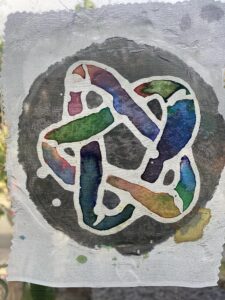
by Eleanor Keating-Jones age 8 April 2024
A Note from your Abbess
There is much uncertainty and unknown right now. Many of us are in deep grief and I encourage you to bestow lavish hospitality on all of your feelings – let your rage, sadness, despair, confusion, and more have space in you. Move your body, let her speak its wisdom, and give yourself the gift of as much rest as possible.
What I do know is that our commitment to a contemplative path does make a difference. Keep showing up with presence to what is real and true. Cherish what is beautiful and kind. Commit to the slowness and centeredness that is its own kind of resistance and from which deep change arises. Know that the ground is Love and we are each radiant sparks of the divine. And act on behalf of the liberation of all beings from these touchstones.
What I also know is that our commitment to creativity is vital. We must continue to cultivate our wild imaginings. Dance and write poems and songs that help us to lament and hope, to make space to dream and be, to let our visions of what is possible take even deeper root in our hearts. This is our life force at work in partnership with Spirit to bring about a more beautiful world.
And the third thing I know is that community is key to all of this. Reach out to a soul friend; gather in small groups to grieve and laugh. Extend the most exquisite kindness to the people you encounter in public spaces, especially those you experience as“other.” Ask for the blessings of your ancestors who endured their own suffering and struggles. Stand in a grove of trees or on the banks of a river and feel your kinship with all creation. And of course, gather with your fellow dancing monks in our programs when possible. To know yourself as not alone, but intimately connected to the delicate and intricate web of all living beings is to claim your power and to live in hope.
–––––––––––––––––––––––––––––––––––––––––––––––––––––––––––––
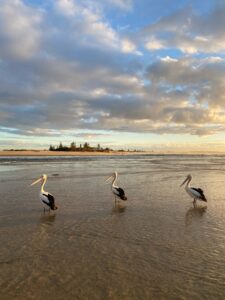
FROM WAYMAKERS
Yesterday, I walked with one of my dearest friends. We did what I imagine many of you are doing after the November 5th elections: reaching out, checking in, feeling the weight of not knowing where our next step will land. It seems clear that, whatever that step might be, it needs to be taken together. So, we locked arms and walked into the sacred, uneasy threshold—a place where one foot is lifted in resistance and resolve but hasn’t quite touched down. This act, balancing on the edge of action, is like a yogic stance, holding our ground in discomfort, wondering when we’ll feel the relief of solid ground again.
This is statio—the ancient, mystical practice of pausing intentionally in the in-between to create sacred space. Statio is the pause that marks a threshold, a moment both of waiting and readiness. It invites us to cultivate hope, courage, and resilience by resting right there in the gap, to find strength in stillness, to gather ourselves in this space between breaths, even when exhaustion tempts us toward fear. And this pause? It’s a place beyond our control; crossing through it may take longer than we ever expected. *Statio* divides one time from another, one ground from the next, and yet, the actual crossing may be guided by forces beyond us, by something holy holding us back until the moment is ripe.
How long can we dwell in statio, with one foot suspended, unsure of where it will land? I don’t know how long. But I know we can hold it longer when there are hands and shoulders to lean on. Who are you holding onto during this collective statio?
As my friend and I walked, we were pulled to a stop by awe: the blue sky’s vast embrace, the proclamation of yellow leaves, and the way the trees’ canopy offered space to one another. This phenomenon—crown shyness—is a fitting metaphor for statio, a sacred space honoring both separation and connection. Just as trees leave intentional gaps between their crowns, letting light and air breathe through the canopy, statio invites us to create a pause between our thoughts, actions, and encounters. These intentional spaces, like the quiet channels between branches, honor the life force within each moment, allowing renewal, clarity, and shared energy to circulate freely, allowing grief to have space to move, and to not rush towards the next agenda and action.
In both statio and crown shyness, there’s a quiet reverence for boundaries that actually deepens interdependence. Trees, by keeping respectful distance, support an ecosystem that nurtures both individual growth and communal vitality. Likewise, when we create pauses in our lives, we make space to connect more deeply to ourselves and to each other.
In my own personal seasons of statio, I find myself drawn to practices that root me deeply in the earth. These grounding rituals connect me to place, bringing me back to the particulars of my own environment and reminding me that small, intentional acts can ripple outward with profound impact. This is the time for nature mandalas, for wandering in wild spaces (urban wilds count too!), for brewing forest tea from what’s nearby, for returning to a quiet sit spot, and for practicing sacred phenology.
These simple, earth-centered practices offer a way to be present in this communal time of statio, each one anchoring us in the now, helping us listen, and encouraging us to become more attentive to the unique rhythms of life within our particular landscapes. These rituals will offer profound guidance when we take our next steps.

John of Gaunt speech in Richard 11. from Shakespeare
His rash fierce blaze of riot cannot last,
For violent fires soon burn out themselves;
Small showers last long, but sudden storms are short;
He tires betimes that spurs too fast betimes;
With eager feeding food doth choke the feeder:
Light vanity, insatiate cormorant,
Consuming means, soon preys upon itself.
–––––––––––––––––––––––––––––––––––––––––––––-
And Parker J. Palmer says:
Trust has been one of the big losers in this era of American politics—and trust is what we must restore if we are to reweave and transform the tattered fabric of our common life. So let’s begin close in, with people we know to be trustworthy. And let’s keep expanding the circle to those who “stand in need” the way we do.
For the past three days, I’ve had a chance to do just that with groups ranging from 4 to 25 to 1,000. It’s been healing and empowering for me.
Slowly, slowly, I’m finding ground beneath my feet again. Slowly, slowly, in the lives of my friends, colleagues, and strangers I’m seeing the bright stars V.P. Harris talked about in her concession speech—good people doing going work against stiff odds—stars that are best seen against the backdrop of a midnight sky.
David Whyte has it right: turn off the noise of what people call “the news.” Tune in to the news of the human heart where ground and guidance for the journey can always be found. Exercise the muscle called trust whenever and wherever we can—and then reach out in trust to one more and one more and one more.
No one is going to rescue us, so let’s start rebuilding a community devoted to the common good from the inside out and from the ground up. We’re all hungry, and we can feed each other.
[David Whyte’s books are at http://tiny.cc/0q7uzz. My 10 books are at http://tiny.cc/r3gtzz.]
––––––––––––––––––––––––––––––––––––––––––––––––––––––––––––––––––––
Kamala Harris:
“Good afternoon. Thank you all, thank you, thank you, thank you, thank you. So let me say, and I love you back. And I love you back. So let me say, my heart is full today. My heart is full today. Full of gratitude for the trust you have placed in me, full of love for our country and full of resolve. The outcome of this election is not what we wanted, not what we fought for, not what we voted for. But hear me when I say, hear me when I say, the light of America’s promise will always burn bright. As long as we never give up, and as long as we keep fighting.
To my beloved Doug and our family, I love you so very much. To President Biden and Doctor Biden, thank you for your faith and support. To Governor Walz and the Walz family, I know your service to our nation will continue. And to my extraordinary team, to the volunteers who gave so much of themselves, to the poll workers and the local election officials, I thank you, I thank you all.
Look, I am so proud of the race we ran and the way we ran it and the way we ran it. Over the 107 days of this campaign, we have been intentional about building community and building coalitions, bringing people together from every walk of life and background, united by love of country with enthusiasm and joy in our fight for America’s future. And we did it with the knowledge that we all have so much more in common than what separates us.
Now, I know folks are feeling and experiencing a range of emotions right now. I get it. But we must accept the results of this election. Earlier today, I spoke with president-elect Trump and congratulated him on his victory. I also told him that we will help him and his team with their transition and that we will engage in a peaceful transfer of power. A fundamental principle of American democracy is that when we lose an election, we accept the results. That principle, as much as any other, distinguishes democracy from monarchy or tyranny. And anyone who seeks the public trust must honor it.
At the same time, in our nation, we owe loyalty, not to a president or a party, but to the Constitution of the United States, and loyalty to our conscience and to our God. My allegiance to all three is why I am here to say, while I concede this election, I do not concede the fight that fueled this campaign. The fight, the fight for freedom, for opportunity, for fairness and the dignity of all people. A fight for the ideals at the heart of our nation. The ideals that reflect America at our best. That is a fight I will never give up. I will never give up the fight for a future where Americans can pursue their dreams, ambitions and aspiration is where the women of America have the freedom to make decisions about their own body and not have their government telling them what to do. We will never give up the fight to protect our schools and our streets from gun violence. And America, we will never give up the fight for our democracy, for the rule of law, for equal justice, and for the sacred idea that every one of us, no matter who we are or where we start out, has certain fundamental rights and freedoms that must be respected and upheld. And we will continue to wage this fight in the voting booth, in the courts and in the public square. And we will also wage it in quieter ways, in how we live our lives, by treating one another with kindness and respect, by looking in the face of a stranger and seeing a neighbour, by always using our strength to lift people up, to fight for the dignity that all people deserve.
The fight for our freedom will take hard work. But like I always say, we like hard work. Hard work is good work. Hard work can be joyful work, and the fight for our country is always worth it. It is always worth it. To the young people who are watching, it is, I love you. To the young people who are watching it is okay to feel sad and disappointed, but please know it’s going to be okay. On the campaign, I would often say when we fight, we win. But here’s the thing, here’s the thing. Sometimes the fight takes a while. That doesn’t mean we won’t win. That doesn’t mean we won’t win. The important thing is don’t ever give up, don’t ever give up, don’t ever stop trying to make the world a better place. You have power. You have power and don’t you ever listen when anyone tells you something is impossible because it has never been done before. You have the capacity to do extraordinary good in the world.
And so to everyone who is watching, do not despair. This is not a time to throw up our hands. This is a time to roll up our sleeves. This is a time to organize, to mobilize, and to stay engaged for the sake of freedom and justice and the future that we all know we can build together. Look many of you know, I started out as a prosecutor, and throughout my career I saw people at some of the worst times in their lives, people who had suffered great harm and great pain and yet found within themselves the strength and the courage and the resolve to take the stand, to take a stand, to fight for justice, to fight for themselves, to fight for others. So let their courage be our inspiration. Let their determination be our charge.
And I’ll close with this. There’s an adage an historian once called a law of history, true of every society across the ages. The adage is only when it is dark enough can you see the stars. I know many people feel like we are entering a dark time, but for the benefit of us all, I hope that is not the case. But here’s the thing, America, if it is, let us fill the sky with the light of a brilliant, brilliant billion of stars. The light, the light of optimism, of faith, of truth and service. HU (Howard University). And may that work guide us, even in the face of setbacks toward the extraordinary promise of the United States of America. I thank you all, may God bless you and may God bless the United States of America. I thank you all.”

